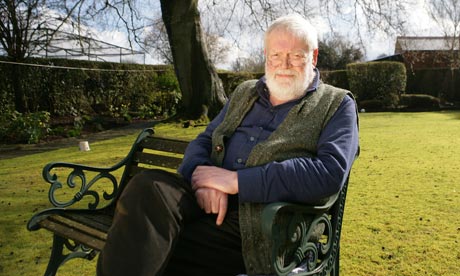
One of the most moving things about Michael Longley's tenth collection is the way in which he considers death, giving it no special treatment, not dressing it up or flattering it. It was Wittgenstein who said "death is not an event in life". But Longley would seem to disagree. It's an ordinary event, in his hands, and he goes straight in with the line: "I have been thinking about the music for my funeral."
In this collection, lullabies are for the end of life as well as for the beginning, and birth and death are never far apart. In Deathbed, he imagines his deathbed as a sort of nest in which a couple of robins come and go, one more leggy than the other, feeding from a cheese dish and a saucer of water – it's a poem of consoling eccentricity. In the beautiful Birthbed that follows pages later, he writes: "I waken in the bed where you were born," and remembers waiting to cradle a new child. These are poems that get under the skin. With the mastery of years of writing, Longley (b.1939) knows the shortcuts to the heart.
Nor is there anything indulgent about the elegiac emphasis: the second half of the collection is dedicated to Longley's twin brother, Peter, whose recent death takes him back to childhood. The Trees deepens as you read it. The felling of dream trees creates no clearing. Death is a receding into childhood's garden – a vanishing perspective. In Longley's work, one often has the sense of a double witnessing, of nature being there for him and the other way round. Plants, trees and birds form a sort of congregation. They are collaborators. Nature is more than scenery. And, rather in the tradition of Gerard Manley Hopkins's poem about Felix Randal the farrier, he also includes (in Homeland) his Irish neighbours whose place on the land is part of the land's story:
And Paddy Morrison, his silage boozy
Under black plastic and old tractor tyres,
Stubble yellowing (his most precious crop
those butterfly orchids on their hummock)
There are sightings, too, of his father – a familiar presence in Longley's poetry, but especially movingly encountered as the generations converge. What matters now is at once the looking forward through a grandchild's eyes (there is a particularly charming poem about a puzzled granddaughter: "During the power-cut/ Maisie wondered: 'Where is me?/ I have disappeared") and the looking back to his own beginnings. In a heart-stopping poem, The Duckboards, set in Carrigskeewaun, he and his brother trail their father's ghost through the landscape: "Teetering on walkways that disappear/ As we follow behind him in the rain."
If nature offers one sort of support, Homer, as a pall bearer, is another. Poems inspired by Greek myth are charged with his brother's life and death to urgent effect: "Are you asleep, Achilles? Have you forgotten me?/ Bury me quickly, please, and let me through Death's/ Gates…" Yet at the same time, Longley is in no way aggrandising. If anything, it's the attention to humble detail that is his poetry's most disarming feature. Take The Stray, a delightful poem in which, after a prayer for her return, he describes the reappearance of Milly, a prodigal cat, at his brother's funeral:
The day of your funeral
In October sunshine
Milly, not the friendliest
Tabby, came home.
And on the subject of friendliness, it suddenly struck me that it is, in part, the warmth in Longley's writing that marks his poems out, makes them cherishable. Never forced, that affection is simply there.

